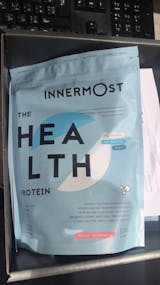At Innermost, we're forward, up front and proud of the ingredients we pack into our research-backed products such as The Lean Protein So proud in fact, that we write blogs on their benefits, boast about their uses and ensure that our Innermoster's are always up to date with the latest and greatest about our ingredients.
When it comes to sweetening our products, we use Sucralose. Sucralose is a no-calorie sweetener that replaces sugar: and all its calories - without sacrificing the sweetness sugar provides that we all know and love.
Why is sugar bad for you?
Why is sugar bad for you? Well, excess sugar should be avoided due to the substance's high calorie count, with increasing amounts of research blaming sugar for a multitude of health issues including diabetes, obesity and tooth decay, the market for zero-calorie sweeteners has never been stronger.
That's where the confusion around sugar alternatives come in.
There is a wealth of content marketing in the fitness and nutrition community to convince you that one is better than another, with speak of "natural sweeteners" that further complicates matters.
Are sweeteners bad for you?
We've done our research into some of the no-calorie sweeteners out there, to work out which one is the healthiest, and which ones you categorically need to avoid.
Let's break down the confusion once and for all.
1. Stevia: A 'Natural' Sweetener
Companies have spent huge amounts of money to convince people that “Stevia” is a natural sweetener but it’s not as simple as that. Stevia is the name of a plant that has sweet tasting leaves.
However, Stevia isn’t legally allowed to be used as a sweetener due to research-based safety concerns. What is allowed is for companies to take Stevia and refine it through a chemical process to turn it into compounds called Steviol Glycosides (E960).
And, even then, there are very tight guidelines on the amount you can use due to continued worries over the long-term effects. When you see “Stevia” listed as a sweetener on food product packaging, that is factually incorrect.
It's also illegal under food label regulations, which state that manufacturers must write “Steviol Glycosides (E960)”. If that wasn't enough to put you off, this sweetener was only approved in some countries to be used as a sweetener in 2011, so it doesn't have a huge time-tested body of research behind it.
2. Thaumatin
You could argue this shouldn't even be on the list. Thaumatin is not approved by the many countries including the US to be classified and used as a sweetener and that's an important point.
This means, that by not going through the approval process, Thaumatin hasn't been through the rigorous testing that approved sweeteners such as sucralose have. Goodbye, Thaumatin.
3. Aspartame
Aspartame has been subject to more scare stories than any other sweetener, but it’s also the most widely used. It’s on the US EPA’s List Of Potential Carcinogens and that’s enough for us to relegate this sweetener to the scrap heap. Enough said.
4. Sucralose
Sucralose is most widely recognised as a calorie-free sweetener used in coffee, such as in brand names like Splenda. Our bodies don't break sucralose down so it passes through without being digested.
Having been around for over 20 years, there has been a huge amount of credible research conducted that supports its credentials. Used extensively and recognised by all major food regulatory bodies in the world as safe, we regard Sucralose to be the best (and safest) sweetener on the market today.
Sucralose is also highly stable so your products stay sweet for longer, and it can also be used for cooking without breaking down into other compounds. We think it's important to stick with sweeteners that have been around for a long time, tested thoroughly, low-calorie, research-tested and widely recognised as safe. And that's why we use Sucralose in our Innermost products.
Summary
We chose every single ingredient across our product range (including our sweetener) in accordance with three principles:
- Functionality
-
Safety
-
Effectiveness
The right concentrations to make a difference. We use lots of natural ingredients but any ingredient must match our principles to justify inclusion as our duty of care to our consumers is paramount.
All in all, when it comes to which sweetener is the healthiest, we're going with Sucralose. In short: are sweeteners better than sugar? Yes. Are sweeteners bad for you? No, not all of them. Not in moderation.
























